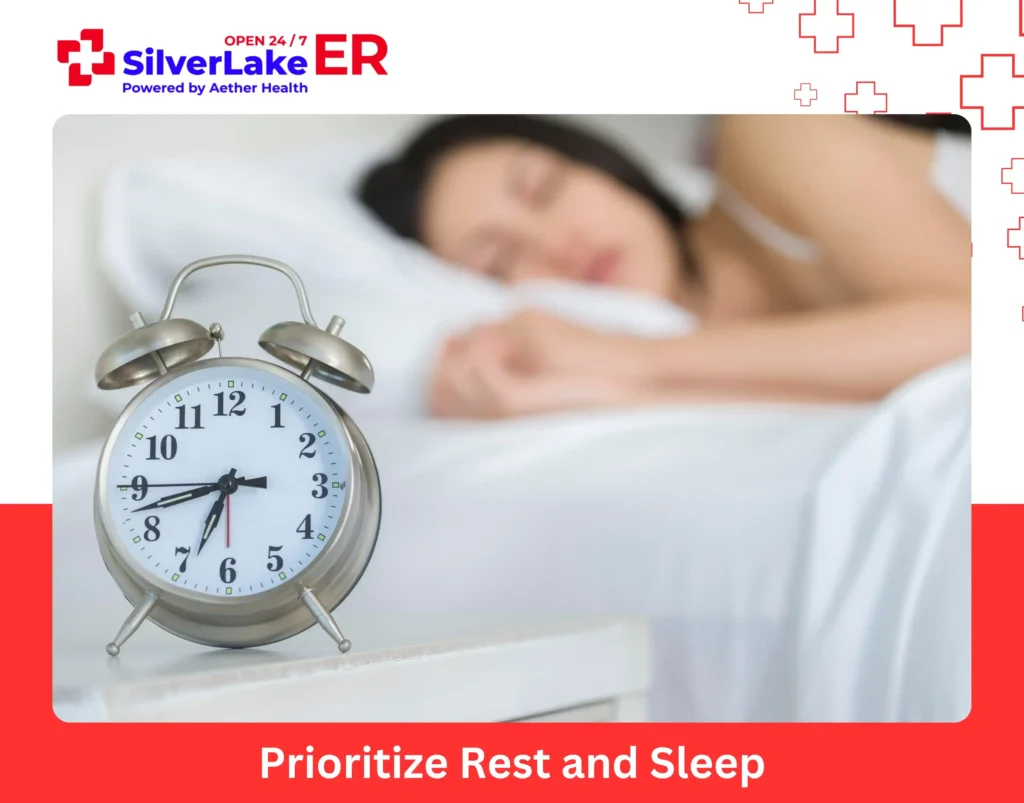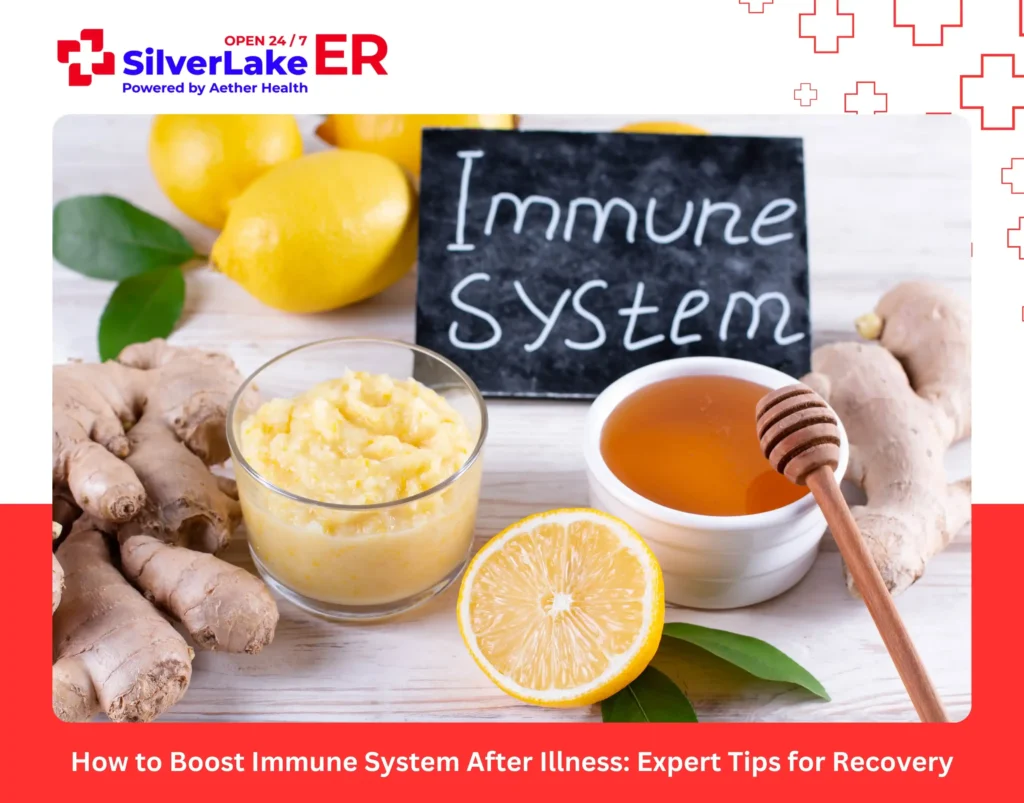Learning how to boost immune system after illness determines whether you bounce back quickly or struggle with lingering fatigue and vulnerability. Your immune system emerges from illness depleted and needs strategic rebuilding.
The right combination of rest, nutrition, and lifestyle adjustments accelerates recovery while strengthening your body’s natural defenses against future illness.
Let’s explore 10 evidence-based strategies that target the specific ways illness weakens your immune system and provide a clear path to complete restoration.
1. Prioritize Rest and Sleep

Rest is your body’s number one recovery tool. During sleep, your body produces and releases cytokines, which are proteins that target infection and inflammation. Without adequate rest, your immune system has a harder time bouncing back.
Tip: Aim for 7–9 hours of quality sleep per night, and allow yourself naps during the day if needed. Avoid screen time before bed to help improve sleep quality.
2. Stay Hydrated
Fluids help flush toxins from the body, transport nutrients, and keep cells functioning properly. Dehydration can weaken your immune system and delay recovery.
Tip: Drink plenty of water, herbal teas, or broths. Avoid excessive caffeine and sugary drinks that may dehydrate you.
3. Eat Nutrient-Rich Foods
Food is fuel, especially after illness. To boost your immune system, focus on foods rich in vitamins, minerals, antioxidants, and protein.
Best Foods to Eat After Illness:
- Fruits and Vegetables: Oranges, berries, spinach, and broccoli are packed with vitamins C and E.
- Lean Proteins: Chicken, turkey, eggs, and legumes help rebuild damaged cells.
- Healthy Fats: Avocados, olive oil, and nuts support cellular repair function.
- Fermented Foods: Yogurt, kefir, and kimchi promote gut health, which is closely linked to immunity.
Tip: Eat small, frequent meals if you’ve lost your appetite, and include a variety of food groups.
4. Rebuild Gut Health
Did you know that over 70% of your immune system resides in your gut? After illness, especially if antibiotics were used, your gut microbiome may need replenishment. To strengthen your body’s defense system, understanding this gut-immune connection is essential.
Tip: Include probiotics (like yogurt and kefir) and prebiotics (like bananas, oats, and garlic) in your diet. Consider a high-quality probiotic supplement if recommended by your doctor.
5. Engage in Gentle Physical Activity
While rest is important, light movement can stimulate circulation and immune function.
Tip: Start with light walks, stretching, or yoga. Avoid high-intensity workouts until you feel stronger. Always listen to your body.
6. Minimize Stress

Chronic stress suppresses the immune system and slows healing. After illness, your mental health matters just as much as your physical recovery.
Tip: Try deep breathing, meditation, journaling, or spending time in nature. Even 10 minutes of daily relaxation can help restore balance.
7. Limit Alcohol and Smoking
Alcohol and smoking can impair immune cells and delay recovery.
Tip: Avoid or limit these substances as much as possible while your body recovers. Opt for non-alcoholic drinks and prioritize a smoke-free environment.
8. Get Some Sunshine (Vitamin D)
Vitamin D plays a key role in immune function. Sunlight exposure helps your body produce it naturally.
Tip: Spend 10–20 minutes a day outdoors if weather permits. Beyond natural vitamin D production, some people may need additional nutritional support during recovery. Ask your doctor about supplements if needed.
9. Consider Supplements (If Needed)
While whole foods provide the best nutrition, some people may benefit from vitamin or mineral supplements after illness. Supplements are especially important if nutrient intake during illness was poor or symptoms linger.
Common Immune-Boosting Supplements:
- Vitamin C
- Vitamin D
- Zinc
- Elderberry
- Probiotics
Tip: Always talk to your healthcare provider before starting new supplements.
10. Regular Check-Ins with Your Doctor

After a significant illness, especially one requiring hospitalization or medication, follow-up care is crucial.
Tip: Keep a recovery journal to track symptoms, energy levels, and appetite. Share this with your doctor during check-ups.
Final Thoughts
Your body is remarkably resilient, but after an illness, it needs proper care to return to full strength. Knowing how to boost immune system after illness can help you bounce back faster and reduce the risk of getting sick again.
By focusing on rest, hydration, nutrient-dense foods, and gentle movement, you can support your immune system’s recovery naturally. Make self-care a priority; you’ve earned it.
FAQs: Boosting Immunity After Illness
1. How long does it take for the immune system to recover after illness?
Recovery time varies by illness and individual, but it can take from a few days to a few weeks.
2. Can supplements alone restore my immune system?
Supplements can help but are most effective when combined with good sleep, nutrition, and stress management.
3. Is it normal to feel tired after getting better?
Yes. Fatigue is part of the recovery process and often resolves with proper rest and care. Understanding fatigue after medical procedures can help you distinguish between normal recovery fatigue and concerning symptoms.
4. Should I return to exercise right after being sick?
Start slowly. Light activity is fine, but intense workouts should wait until you feel fully recovered.
5. Can I boost immunity naturally without medication?
Yes. Diet, sleep, hydration, and stress reduction are all effective natural ways to support your immune system.




